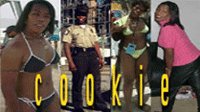 SHADOWS ARTHOUSE FILMS ’04
SHADOWS ARTHOUSE FILMS ’04On this page ‚àö‚â• Key films from the British Film Institute's 18th London Lesbian & Gay Film Festival, Mar-Apr.04
Opening and closing films: THE EVENT | ROBIN'S HOOD
Centrepiece films: EATING OUT | THE COOKIE PROJECT
< < M O R E | M O R E > >
More mainstream art films have their own pages.
Other offbeat films are at: SHADOWS FILM FESTIVAL | FESTIVAL SHORTS
last update
13.Mar.04
 THE EVENT
THE EVENT


|
dir Thom Fitzgerald • scr Tim Marback, Steven Hillyer, Thom Fitzgerald with Parker Posey, Don McKellar, Olympia Dukakis, Sarah Polley, Brent Carver, Jane Leeves, Joanna P Adler, Cynthia Preston, Rejean Cournoyer, Christina Zorich, Jaclyn Markowitz, Glen Michael Grant release US 3.Oct.03, UK 24.Mar.04 llgff • 03/Canada 1h52  REVIEW BY RICH CLINE |
Fitzgerald assembles this in a slightly disjointed stream of consciousness, as flashbacks intermingle with present-day scenes. The result is overwhelmingly powerful, digging into intensely personal issues and drawing out strong performances. As usual, McKellar is especially good as the matter-of-fact Matt, facing the inevitable with warmth and humour (and occasionally raw fear), while believing that you should "always leave the party when you're having a good time!" Polley is the other standout, as his cynical, hilariously opinionated sister. And Dukakis shines as well in a slightly muted but electrically charged role as a Jewish mother facing unwanted truth with humour and honesty.

Which kind of defines the entire film. Fitzgerald stirs up conflicting emotions as he switches us from the bleak-grey present to warmer, more colourful flashbacks, ricocheting from funny to sad and back again in a powerfully real-life sort of way. Some scenes are confusing, some are glaringly pointed; parts of the film are overwrought and heavy-handed, while other sequences are so subtle you only catch the meaning subliminally. The investigator plot device is rather hackneyed (as is Posey's mopey performance), but each of the side characters have moments of surprising power. Fitzgerald alternates between being silly, serious and sentimental as he builds beautifully to the Kleenex-soaking finale. A bracing and unforgettable film. [R strong themes, language, drugs] 16.Mar.04 llgff
 ROBIN’S HOOD
ROBIN’S HOOD


|
dir Sara Millman • scr Khatee V Turner, Sara Millman with Khatee V Turner, Clody Cates, Kimberley T Ridgeway, Aaron Grijaiva, Lee Vogt, Dante Robinson, Katherine Sommers, Jushua Burns, Richard Kelesey, Rebecca Michaels, Shia Eden, Melissa Beanstein release UK Apr.04 llgff • 03/US 1h21  REVIEW BY RICH CLINE |
There's a smooth, mellow vibe that makes the film surprisingly engaging, and combined with the strong story and some good acting, we can basically overlook the more amateurish filmmaking (very rough video and sound editing, plus some cheesy narration and clunky plot turns). The romantic storyline is fairly standard stuff, but Turner and Cates play it nicely, and obviously enjoy blurring the lines between their good girl/bad girl roles. Turner brings Robin's inner struggle out effortlessly; Cates is especially intriguing, adding an edgy brittleness to her bravado (although her explosions of rage are slightly unconvincing). Meanwhile, the film touches on some extremely important issues that haunt a society in which poor people are simply abandoned by governmental inefficiency, apathy and even institutional racism. So if it all gets a bit preachy in the end, you forgive the filmmakers because it's also both urgent and, sadly, true. [themes, language, violence, sex] 7.Mar.04 llgff
 EATING OUT
EATING OUT


|
dir-scr Q Allan Brocka with Scott Lunsford, Jim Verraros, Ryan Carnes, Emily Stiles, Rebekah Kochan, Jillian Nusbaum, Billy Shepard, Ted Kraus, Shanda Storemont, Pistol Pete Kelly, Patti Bailey, Murph Michaels release UK 24.Mar.04 llgff (world premiere), US 22.Apr.05 • 04/US 1h30  REVIEW BY RICH CLINE |
Yes, the farcical storyline gets increasingly sit-com like as it throws in all sorts of nutty plot twists. Brocka's script is perhaps a little too clever--every line seems to contain several extremely witty plays on words, which are great fun to listen to but so sharp that they begin to sound like composed dialog rather than people talking to each other. Fortunately, the actors are all excellent, which is unusual in a film made on a budget this small. Even though it looks like it was shot on home video, the direction, writing, editing and acting are all strong enough to draw us into the story and keep us laughing. There are also a couple of intensely sexy scenes that blend comedy and steaminess perfectly. And the script actually deals with the thorny issue of sexuality in a much more mature way than simplistic Hollywood movies do, admitting that the lines are blurred in real life, and then having a lot of fun with the idea! This is an auspicious feature debut for Brocka, who's hopefully got a lot more up his sleeve. [themes, language, sex, brief nudity] 22.Feb.04 llgff
See also: EATING OUT 2: SLOPPY SECONDS (2006)
EATING OUT: ALL YOU CAN EAT (2009) | EATING OUT: DRAMA CAMP (2011)
 THE COOKIE PROJECT: One
THE COOKIE PROJECT: One 

|
dir-scr Stephanie Wynne with Cookie Fields, Toya Fields, Delwin Fields Jr, Madeline, Wes Burgess, Gerrard Willis, Dorothea Bryant, Dr Preecha, Dr Saran, Stephanie Wynne release UK Mar04 llgff • 03/US 1h00  REVIEW BY RICH CLINE |
But where the film really digs is into Cookie's gender shift. Over the course of three years, the film crew conducts a series of interviews during which we watch Delwin become Cookie, climaxing with a seriously horrific 20-minute sequence in which we watch, in close-up, the actual operation in Thailand. This is very strongly signposted, and it's shockingly difficult to watch, but it's also what makes this documentary stand out from the crowd. Because otherwise, it's rather weakly made--one-sided with only half-hearted attempts to get into either the psychology of the issue or Cookie's mind. She is presented as a strong, sunny, vibrant person with virtually no shadows. When she says she's proof that "God doesn't make mistakes," we can actually understand her logic. And yet the film is almost clinically detached, avoiding emotion and refusing to explain key elements from her life. Then at the end, Wynne appears in an amateurish straight-to-camera gush-a-thon, unnecessarily explaining everything we've just seen. With a bit more tenacity and a lot more trust in her viewers, this could have been an essential film on the subject. As is, it pales in comparison to Parris Patton's brilliant Creature (1999), which tells a similar story but with more skill and emotional resonance. [adult themes, graphic medical gore, nudity, language] 22.Feb.04 llgff
